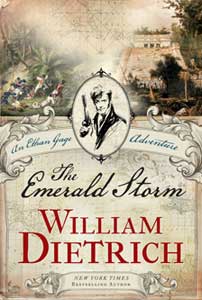History, Mystery, and Joy
When planning a murder, the first thing you need is a time machine.
 No DNA evidence to convict, if you go back three decades.
No DNA evidence to convict, if you go back three decades.
No fingerprint evidence if you go back 150 years.
Of course, no insanity plea either. No psychiatry, no killer profiling, no rehabilitation, and precious little mercy. All punishment was cruel, and none of it was unusual.
If you use a gun you’d better hit the first shot, because it will take a minute or two to load, ram, prime, and fire again.
So it was different back then, and way different way back. Just ask Gordianus the Finder, the detective of Steven Saylor’s late Roman Republic novels, or Lindsey Davis’s Marcus Didius Falco, sleuth of the early Roman Empire.
Or was it so different? The appeal of the historical mystery is that of all historical fiction: history’s best adventures, while experiencing the continuity of human emotion and intellect. We read historical mysteries to look in the mirror, for an amusing reflection of ourselves.
The popularity of historical mysteries is fairly recent. Davis published the first of her series in 1989 and Saylor in 1991, a period in which future shock and nostalgia accelerated the popularity of the genre. But its roots go further back. In 1918, Melville Davisson Post started his Uncle Abner series set in the early nineteenth century, before America had any real police system. Anna Katharine Green, who pioneered many mystery story staples (involving “clews”), wrote historical whodunits in the late nineteenth and early twentieth century.
Agatha Christie produced a 1944 mystery set in ancient Egypt. “Ellis Peters” (the pen name of Edith Pargeter) wrote the Brother Cadfael medieval mysteries starting in 1977. Umberto Eco had a huge success with The Name of the Rose in 1980, helping popularize the genre.
A related thriller branch uses contemporary or near-contemporary heroes (i.e., Indiana Jones) to solve mysteries revolving around ancient relics or lost cities. Authors include Dan Brown, Ken Follett, Robert Harris, Steve Berry, James Rollins, Kate Mosse, and Katherine Neville, to name just a few.
My own Ethan Gage (Napoleon’s Pyramids) is an American adventurer in Napoleonic times caught up in ancient Egyptian, Greek, Nordic, and Aztec mysteries. This means I have to poke into at least two historical periods for each book—Ethan’s day and whatever ancient time he is pondering.
Why bother, when the contemporary world is so rich?
For me, history is an escape from our own troubled world. It puts modern contretemps in perspective since the world is always messed up; there were no “good old days.” The past itself is a mystery, because we don’t have the records to fully understand where we came from. One theme Gage returns to is the idea that civilization got a mysterious “jump-start” several thousand years ago. Old relics can be new MacGuffins, the plot drivers of a good story.
Each period offers the mystery writer new problems and opportunities. From murky street lighting to dynastic upheaval, from primitive poisons to the bloody necessity of closing with knife and sword, the past offers twists on the crimes of the present. The solution lies not in the lab but in close observation and doughty pluck.
Real-life historical characters are more interesting than most imagined ones. Lucrezia Borgia, Rasputin, Jack the Ripper, and John Wilkes Booth will never go out of style.
I like spending time back then. The Napoleonic era was hideously cruel and gloriously beautiful, an era when there were still blank spaces on the maps. Armies, ships, women, palaces, and wildernesses had a grace and power gone in our globalized, computerized, battleship-gray world.
But you don’t have to go that far back: 1920s Los Angeles, 1930s Russia, and 1940s Germany are as exotic by now as ancient Sumeria.
One thing that sets today’s reader apart is our historical consciousness. Movies, television, and books have made the past immediate in ways that stiff oil paintings and marble statues could not for our ancestors. We feel kinship.
Authors have made detectives of Leonardo da Vinci (author George Herman), William Shakespeare (Simon Hawke), Jane Austen (Stephanie Barron), Mark Twain (Peter Heck), Arthur Conan Doyle (Mark Frost and Roberta Rogow), Ambrose Bierce (Oakley Hall), Beatrix Potter (Susan Albert), Elizabeth I (Karen Harper), and Ben Franklin (Robert Lee Hall), to name just a few.
So much history, so little time: They’re on my list! The great thing is that we know who these famous figures were and yet can still discover them. The mysteries of history should keep us happily baffled for many pages to come.
###
William Dietrich is a New York Times best-selling author, Pulitzer Prize-winning journalist, and professor of environmental journalism and writing at Western Washington University. He has written fifteen books, including the historical fiction series featuring Ethan Gage.
